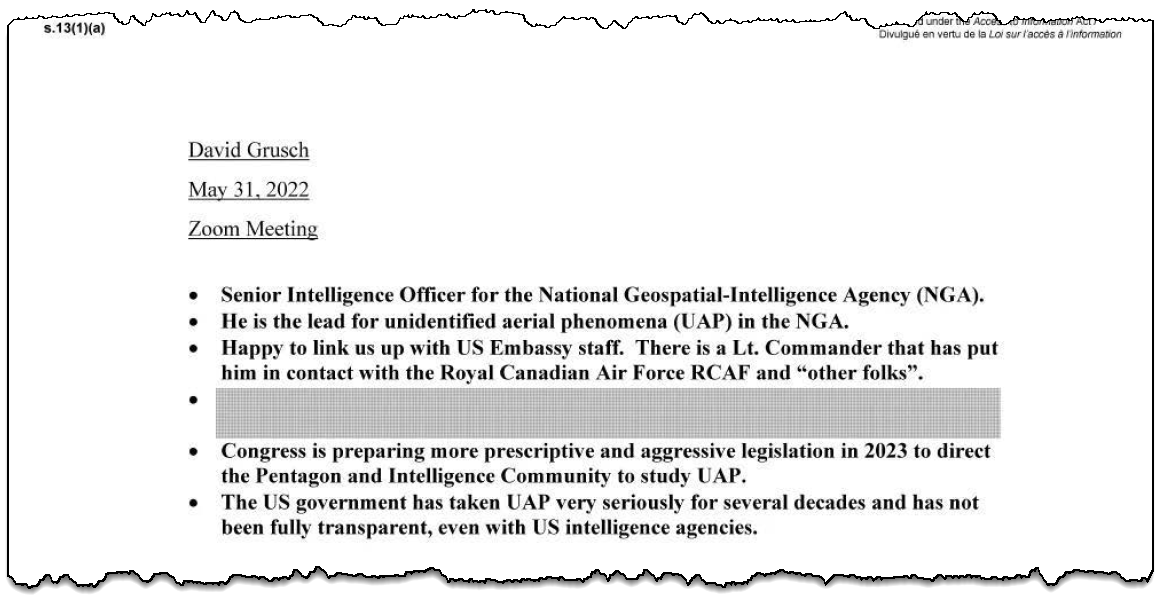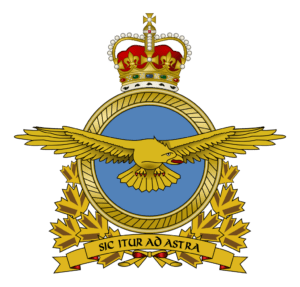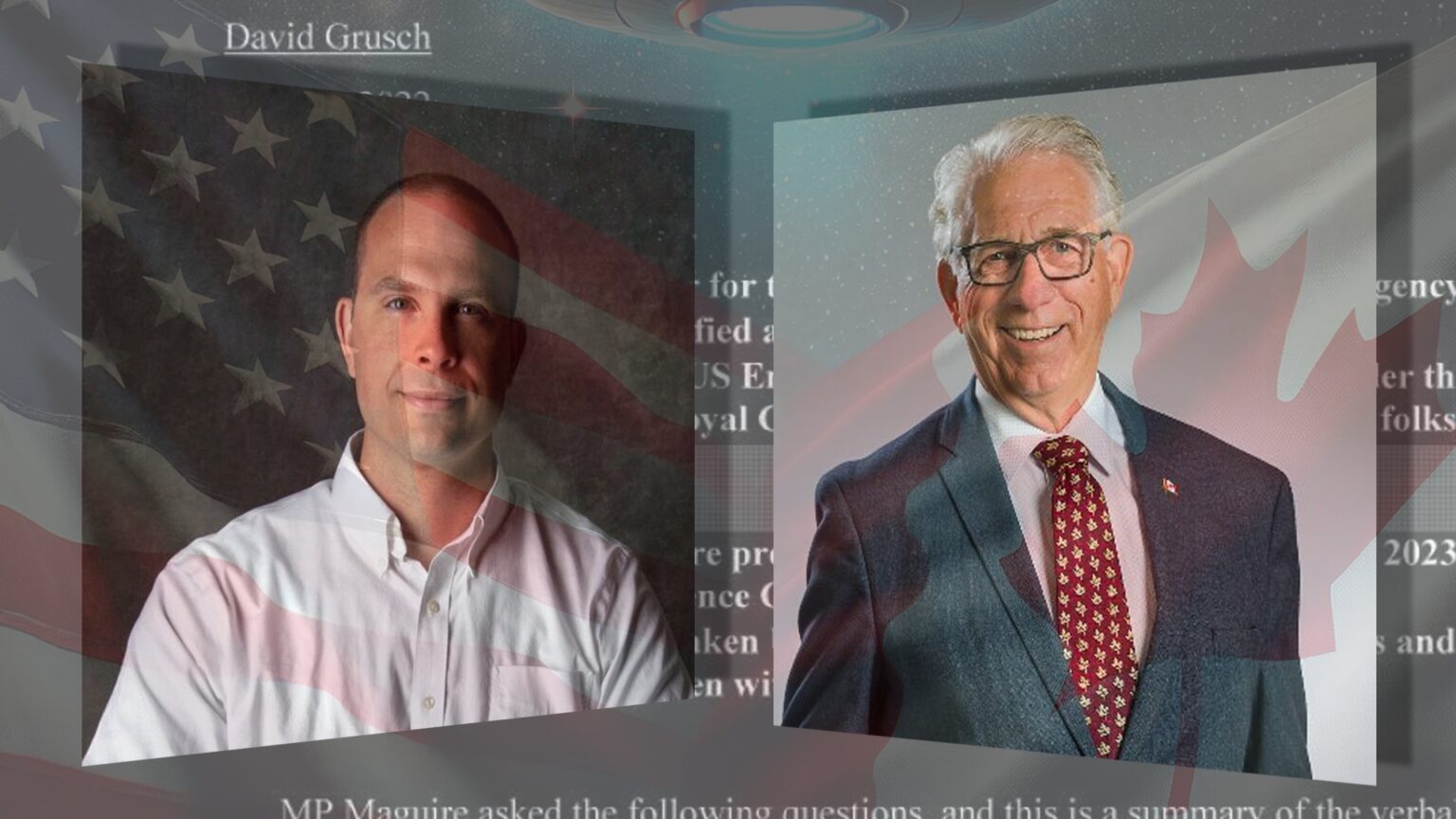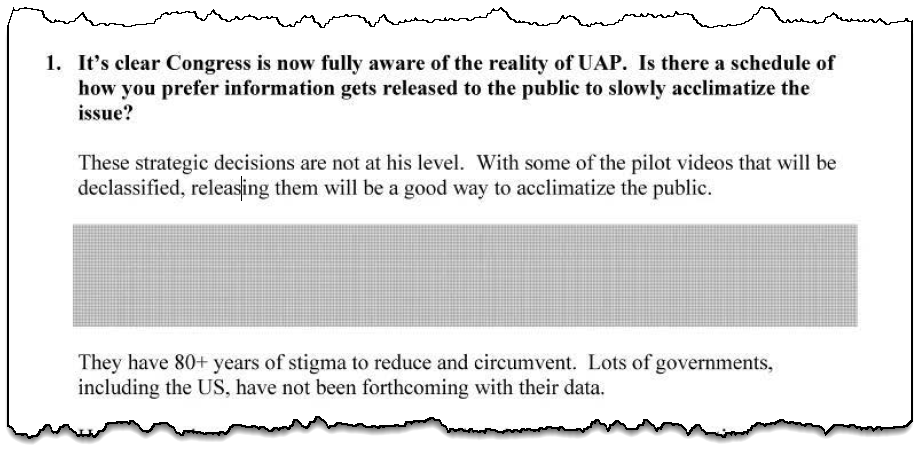Newly released documents obtained under Canada’s Access to Information Act have revealed details of a meeting between Larry Maguire, a Canadian Member of Parliament, and David Grusch, a senior intelligence officer with the U.S. National Geospatial-Intelligence Agency (NGA) that many in the media have called “The UFO Whistleblower“. The meeting, which occurred on May 31, 2022, focused on Unidentified Aerial Phenomena (UAP) and sheds light on discussions about sensitive topics spanning international borders. The documents, uncovered by open-source researcher Steve Te after a lengthy appeal process, provide partial insight into the exchange but are heavily redacted, leaving significant questions unanswered.
 The meeting between Maguire and Grusch took place over a year before Grusch’s public testimony before the U.S. Congress in July 2023 and prior to his April 2023 Defense Office of Prepublication and Security Review (DOPSR) approval for publicly discussing information related to UAPs. This timing raises important questions about whether Grusch, who discussed highly sensitive topics with a foreign government official, had the necessary authorization or assurances that what he disclosed was unclassified. Despite the unclassified designation of the meeting, the extensive redactions in the documents suggest that the topics discussed were considered sensitive enough to warrant shielding from public view, adding to the controversy surrounding Grusch’s role and the international dimensions of UAP discourse.
The meeting between Maguire and Grusch took place over a year before Grusch’s public testimony before the U.S. Congress in July 2023 and prior to his April 2023 Defense Office of Prepublication and Security Review (DOPSR) approval for publicly discussing information related to UAPs. This timing raises important questions about whether Grusch, who discussed highly sensitive topics with a foreign government official, had the necessary authorization or assurances that what he disclosed was unclassified. Despite the unclassified designation of the meeting, the extensive redactions in the documents suggest that the topics discussed were considered sensitive enough to warrant shielding from public view, adding to the controversy surrounding Grusch’s role and the international dimensions of UAP discourse.
The meeting notes document Maguire asking Grusch 14 detailed questions about UAP-related issues. Grusch’s responses touched on topics such as U.S.-Canadian collaboration on UAP investigations, NORAD’s involvement, and theories about UAP activity near nuclear facilities. Notably, Grusch mentioned the existence of compelling UAP footage held by the U.S. government, which he suggested could help acclimate the public to the reality of the phenomena.
He also referred to historical Canadian research efforts, such as Project Magnet, led by Wilbert Smith in the 1950s, indicating a potential historical role for Canada in gathering and studying UAP data.

In discussing current U.S.-Canadian interactions, Grusch described limited cooperation between the two nations, citing classified meetings between the U.S. National Intelligence Manager for Aviation and the Royal Canadian Air Force earlier that year. He also emphasized the necessity of physical evidence to determine the origins of UAP, highlighting the limitations of relying solely on passive data collection such as radar and infrared sensors. Yet, many of his statements were obscured by redactions, which included entire answers to several key questions posed by Maguire.
The redactions themselves raise critical questions about the transparency of the meeting and the information exchanged. Canadian authorities justified the redactions by citing potential harm to international relations, specifically with the United States. Despite these justifications, it remains unclear why a meeting believed to be unclassified would require such extensive redactions.
Since June 2023, The Black Vault has been pursuing a FOIA request with the NGA to obtain emails from David Grusch’s inbox containing a comprehensive list of UAP-related keywords. This request holds the potential to unveil an extraordinary inside look at Grusch’s UAP-related activities, including his meeting with Maguire and possibly much more. However, as of the day this article is published, The Black Vault has been informed by the NGA that the request is approximately #200 on the agency’s backlog list, with an estimated completion time stretching to 22 to 25 months.
Document Archive
 Loading...
Loading...
Follow The Black Vault on Social Media:


